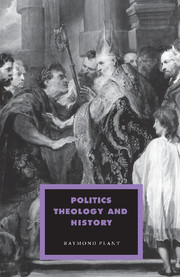Book contents
- Frontmatter
- Contents
- Preface
- 1 Liberal society and political theology
- PART I THE POSSIBILITY OF POLITICAL THEOLOGY
- 2 Theology and politics: context, community and prophecy
- 3 God, history and political theology
- 4 Totality, finitude and history
- 5 Narratives and foundations
- 6 Natural law and natural order
- PART II THE SITE OF POLITICAL THEOLOGY
- PART III LIBERALISM, RELIGION AND SOCIAL UNITY
- Select bibliography
- Index of names
- Index of subjects
- CAMBRIDGE STUDIES IN IDEOLOGY AND RELIGION
4 - Totality, finitude and history
Published online by Cambridge University Press: 23 November 2009
- Frontmatter
- Contents
- Preface
- 1 Liberal society and political theology
- PART I THE POSSIBILITY OF POLITICAL THEOLOGY
- 2 Theology and politics: context, community and prophecy
- 3 God, history and political theology
- 4 Totality, finitude and history
- 5 Narratives and foundations
- 6 Natural law and natural order
- PART II THE SITE OF POLITICAL THEOLOGY
- PART III LIBERALISM, RELIGION AND SOCIAL UNITY
- Select bibliography
- Index of names
- Index of subjects
- CAMBRIDGE STUDIES IN IDEOLOGY AND RELIGION
Summary
Truth in essence can only be one.
(Pannenberg, Basic Questions in Theology, II)What then is truth? A mobile army of metaphors, metonymies, and anthropomorphisms ± in short, a sum of human relations which have been politically and rhetorically enhanced, transposed and embellished, and which after long use seem binding to a people.
(Nietzsche, Werke, III)Interpretation can never be brought to an end, simply because there is nothing absolutely primary to interpret, because at bottom everything is already interpretation.
(Foucault, Nietzsche: Cahiers du Royaument No. 6)In the last, chapter we reviewed three approaches to the theology of history. The theology of history is a clear candidate for the mediating link between universal and particular in political theology, since such theodicies could claim to promote a universal explanation or meta-narrative of the historical process while at the same time being enmeshed in the particularities of specific societies, their histories and their practices.
In this chapter, I want to push the discussion a bit further by taking up the point made towards the end of the previous chapter about whether a theology of history makes too extreme a set of demands on human finitude. I shall do this first of all by looking at the work of Pannenberg in this respect, since to some extent his own views about a universal or theology of history arise out of a response to Hegel.
- Type
- Chapter
- Information
- Politics, Theology and History , pp. 79 - 111Publisher: Cambridge University PressPrint publication year: 2001



